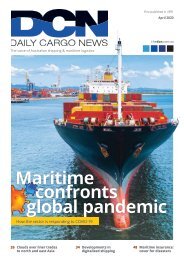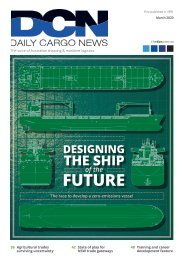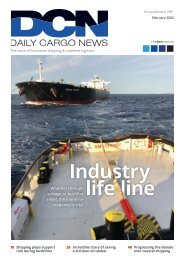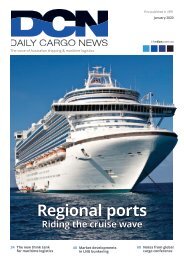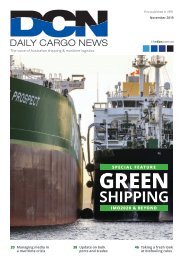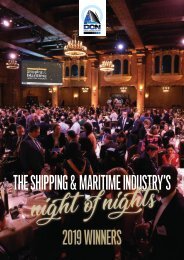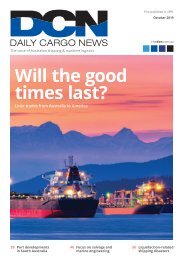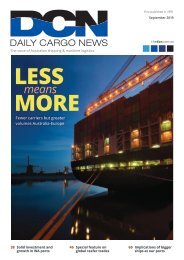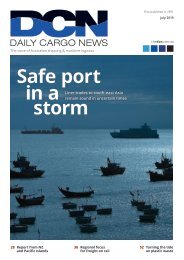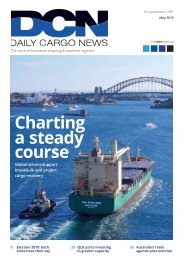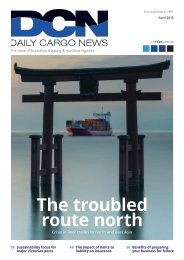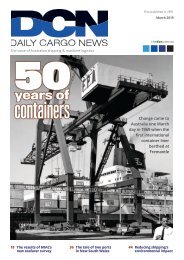DCN0718_Combined_150
Create successful ePaper yourself
Turn your PDF publications into a flip-book with our unique Google optimized e-Paper software.
FUTURE GENERATIONS<br />
The next generation in<br />
the invisible shipping industry<br />
Shipping is facing a big problem in sourcing the next generation of seafarers, with<br />
younger people leaving the industry, or not joining at all, writes Stephen Westfield<br />
IN LATE 2017, I WAS SHOCKED TO<br />
receive more than 30 email bounce<br />
backs from a distribution to Young<br />
Shipping Australia (YSA) members after<br />
sending out an invitation to one of<br />
our monthly functions. They had left<br />
the industry, moved on from the lines,<br />
logistics providers, freight forwarders<br />
and associated industry companies<br />
where they had once worked and had<br />
been valued industry contributors.<br />
It was a sobering reality that many<br />
young people had quit the industry.<br />
It is true we had just come out of the<br />
longest and most depressed periods<br />
for shipping rates in a generation. The<br />
email bounce-backs drove home that<br />
suddenly, there were fewer opportunities,<br />
stagnant wage growth, smaller bonuses<br />
and more attractive jobs elsewhere in<br />
other industries. In addition, there has<br />
been progressively more automation in<br />
shipping which has resulted in rising<br />
redundancies and the movement of<br />
back-office roles away from Australia to<br />
cheaper labour markets. Few industries,<br />
and shipping is certainly not one of<br />
them, have not been seriously affected by<br />
digital technology and a relentless search<br />
by major employers for low-cost labour.<br />
At sea, there is a looming shortage<br />
of seafarers. A Drewry report released<br />
in early 2018 warned that, globally,<br />
shipping will require an additional<br />
42,500 officers by 2019. Attracting the<br />
next generation of workers at sea from<br />
the most consumerist generation in<br />
history is proving difficult. Increasingly<br />
quicker port turnarounds, stringent<br />
security and visa requirements,<br />
combined with seven-day working weeks<br />
and long periods of time away from<br />
family, the industry faces a challenging<br />
task in attracting the best people.<br />
So what attracts people to maritime<br />
industry in the first place? This<br />
silent industry dominated by global<br />
conglomerates few outside have heard<br />
of that are responsible for ultimately<br />
transporting almost every item bought<br />
by households worldwide. I believe<br />
that most people who end up working<br />
in the maritime industry simply fall<br />
into it through family or a friend, or<br />
by applying for a job after university<br />
The email bounce-backs drove home that suddenly,<br />
there were fewer opportunities, stagnant wage<br />
growth, smaller bonuses and more attractive jobs<br />
elsewhere in other industries<br />
or school to a company that happens<br />
to be logistics-related. Intentional or<br />
not, industry joiners will soon come<br />
to a realisation of a whole new world.<br />
The scale of the industry that delivers<br />
your winter sweater or newest iPhone is<br />
mind-boggling once it is appreciated how<br />
complex it is. Some are attracted to the<br />
romanticism of a career in the industry<br />
involving great vessels, international<br />
trade across jurisdictions and vast seas.<br />
I believe there is room for<br />
improvement here in Australia. We<br />
need to attract the best and brightest<br />
to our industry, as we have fallen well<br />
behind based on comparisons with other<br />
more traditional maritime countries<br />
such as Singapore, Germany, Greece<br />
and the Scandinavian nations. The<br />
Singapore Maritime Foundation is worth<br />
noting for promoting potential career<br />
paths within the industry for talented<br />
university graduates. It is not only up<br />
to industry bodies, but also the private<br />
sector to share the role of attracting the<br />
best young strategic thinkers with an<br />
aptitude for technology. With improving<br />
freight rates and for most global shipping<br />
companies, it will be interesting to see<br />
if better returns allow for more enticing<br />
offers to potential industry entrants. It<br />
will be the industry that benefits most by<br />
adopting this course of thinking.<br />
YSA was established to encourage and<br />
assist young professionals in the shipping<br />
industry in Australia with regular<br />
educational and social events tailored to<br />
professional development for the under<br />
35s age group. If you would like to get<br />
involved in Young Shipping Australia,<br />
our email is ysa@shippingaustralia.<br />
com.au. Upcoming YSA events in<br />
Sydney include networking drinks in<br />
July and a breakfast panel with industry<br />
representatives in August. You can also<br />
kickstart your knowledge of the shipping<br />
industry with online training courses<br />
available through Shipping Australia at:<br />
www.shippingaustralia.com.au/coursesand-careers/courses/online-courses/.<br />
Above: Stephen Westfield, chairman, Young<br />
Shipping Australia, New South Wales<br />
Image supplied<br />
26<br />
First published in 1891<br />
July 2018 thedcn.com.au



